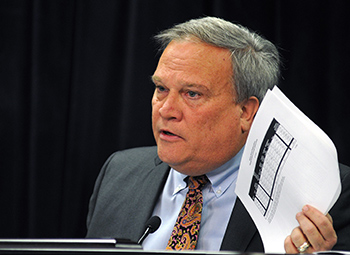
By Jacqueline Pitts, The Bottom Line
After a difficult 2018 legislative session with reforms made to the state’s pensions systems and tax code while balancing a budget, Senate President Robert Stivers spoke with The Bottom Line about what was accomplished by legislators this year and what must come next.
Speaking to The Bottom Line at Hemlock Lodge at Natural Bridge on Wednesday, Stivers said he believes communication was a central problem with the process on pension reform as there were many messages floating around and a lot of misinformation. However, he said the hybrid cash-balance plan new teachers will be moved into under the new law will help shore up the Kentucky Teachers Retirement System (KTRS) moving forward.
“It’s a fair system. And even the teachers’ unions for the KTRS are saying it has the potential for being a better system than what they currently have with portability,” Stiver said, adding new teachers could now take their retirement savings with them if they choose a different career path.
In terms of whether or not the reforms will ensure the systems are sustainable moving forward, Stivers said it is a part of the solution as it “stops the digging” but added more funding will still be needed moving forward to “fill in the hole.”
“We could throw more money at it and more money at it, it would never be sustainable until we changed the components and the function of the system. So now, with additional contributions, it will become sustainable and it will stabilize,” Stivers said.
Because of the growing pension costs and other budgetary restraints, the General Assembly enacted tax reform at the end of the 2018 session in an effort to make the state’s tax code more competitive and bring in additional revenue.
Stivers said tax reform is not something they “particularly care to do, but it is something we had to do.” The Senate President said they would have liked to go further on tax reforms in areas such as lowering the personal and corporate income rates and other areas.
“The individual will be able to control his tax exposure because we are dropping the rate and it will be based on your consumption, not on how much you earn,” Stivers said. “And if we can go further to make it more like a Tennessee, a North Carolina, or a Florida system, that’s where I believe we should go.”
When asked if there will be any more discussions on tax reform in the coming months and years or changes made to the reforms they did pass, Stivers said lawmakers will be monitoring the progress of the new reforms in the coming months to see if any tweaks are necessary and added tax reform will continue to be a topic of conversation as the General Assembly seeks to make the state more competitive.
Watch the interview segment with Senate President on pension and tax reforms below (and continue reading under the video for his take on the rest of the 2018 session):
Another bill that saw passage during the legislative session was workers’ compensation reforms which seeks to update the state’s workers’ compensation system to provide better care for injured workers and more affordable workers’ compensation costs for Kentucky businesses.
Stivers said the new law should address the biggest cost driver within the workers’ compensation system which he said is the medical side. He added workers who are hurt and truly need medical benefits will still get the same type of payments. (Hear the discussion on workers’ compensation reforms at the start of the video below.)
In terms of bills left on the table, Stivers said there is still more work to be done on net metering, legislation that would update Kentucky’s energy policies dealing with private solar energy customers and how they are reimbursed for the excess energy they provide to electricity providers.
“If we don’t do net metering, the people we are going to hurt the most is the individuals who can’t afford to put solar panels on their house,” Stivers said.
Another area the legislature plans to continue work on, Stivers said, is medical liability reform. The Senate President said while they will not be able to get a constitutional amendment on the ballot this year to enact a cap on non-economic damages, there are still laws that need to be passed in order to make the state a better place to do business.
The segment with Stivers on the 2018 session can be seen here:
More of the interview with Senate President Stivers including his take on the 2018 elections and what comes next for transportation funding will be on The Bottom Line next week.




















Add Comment